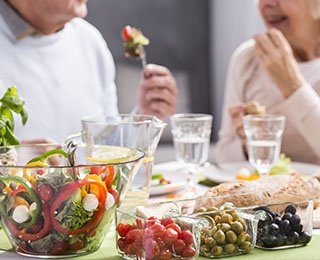There are advantages to each stage in life. Youth has exuberance, maturity has steadfastness, and age has wisdom. Our bodies are changing throughout our lives. You wouldn’t feed an infant the same type of food as you’d give to a teenager. You wouldn’t expect a 90-year-old to run a marathon (although some do). So, it’s important to help your parent engage in activities that will help them stay healthy, active, and independent.
Diet
Older adults tend to eat the same food as they did when they were younger even though their bodies have changed. Seniors need more of certain nutrients. They include: Vitamin D Because most seniors don’t get out in the sun enough, especially during the winter, they are more likely to suffer from a vitamin D deficiency. Other reasons include decreased dietary intake, reduced skin thickness, impaired intestinal absorption, and impaired hydroxylation in the liver and kidneys. Vitamin D deficiency results in muscle weakness, increased risk of death from cardiovascular disease, cognitive impairment in older adults, and cancer. In the summer, 15 minutes in the sun should provide your parent with enough Vitamin D for a couple of weeks. If your parent’s medication prevents them from getting sun or it’s winter, encourage them to eat vitamin D–containing products, such as fatty fish, vitamin D–fortified milk or margarine, or multivitamins. Vitamin B12 Older adults are at a higher risk of B12 deficiency due to decreasing absorption and dietary changes or decreased food intake. B12 deficiency can result in pernicious anemia, glossitis, spinal cord degeneration, peripheral neuropathy, weakness, loss of balance, personality changes, and mental confusion or dementia. Symptoms may be irreversible if not treated early. The Institute of Medicine recommends that adults 50 and older receive vitamin B12 from a supplement or fortified product, because the B12 is unbound and more apt to be available for absorption. Folic acid Deficiency can result in megaloblastic anemia, glossitis, diarrhea, fatigue, increased risk of cardiovascular disorders, and possibly cancer. Be aware, though, that folic acid may interfere with the absorption of B12, so ask your parent’s physician before you give them a supplement. Vitamin C Since this vitamin can’t be made by the body, it’s easy to become deficient if your parent does not eat foods high in the vitamin. Deficiency in vitamin C has been associated with degenerative disk disease in the elderly, scurvy, slow healing from wounds and burns, and decreased iron absorption.
Exercise
Although your parent may prefer leisurely walks, they’ll be much healthier if they engage in moderate aerobic activity for a minimum of 150 minutes a week, as well as weight training. Aerobic Activity The minimum amount of moderate aerobic activity recommended is 150 minutes a week, but more is better. That doesn’t mean your parent must work out 30 minutes or an hour at a time; they can break it up into smaller segments, although in this case, longer is better. Walking, swimming and yoga are 3 types of safe exercises that produce good results for older adults. Weight Training Aging is associated with a loss of muscle mass and muscle strength. This increases the risk of falling. Weight training is the quickest and easiest way to increase muscle mass and muscle strength. You can buy a pair of 2-pound dumbbells for about $10 or purchase the ones you can buckle onto your parent’s wrist if they don’t have a good grip. Try power-walking with weights. Start out with 5 minutes a day, then increase.
Brain Training
Dementia prevention begins with a good diet and exercise; however, the third factor is learning. The more your parent learns new things, the less likely they are to develop dementia. Encourage them to learn how to use technology, to be your navigator when driving, to volunteer for their church or synagogue, or to take up a new hobby.

